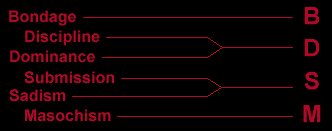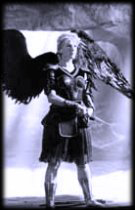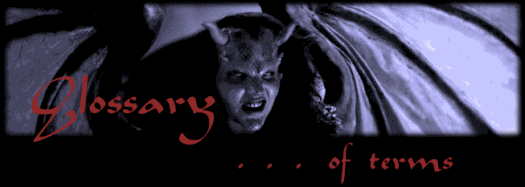
GLOSSARY AND FAN FICTION INTRODUCTION
Last Updated: March 13th, 2001
This started out as a simple glossary, but I got completely carried away. I did, however, purposefully set out
to make the definitions exhaustive, and some of the entries resemble encyclopedia entries more so than dictionary definitions.
Some of these terms are Herc-Xenaverse specific, although I occasionally make reference to other fandoms, and
reference other fandom's glossaries. In addition, some terms are described within the context of this site.
WARNING
I don't beat around the bush (I beat in it…uh, oops), so if you can't deal with dirty words then…what the
hell are you doing on this site?!? I also discuss the site's usage of the terms rape and sexual
violence so please do not read those entries if the subject matter disturbs you. I was also feeling kinda goofy when I wrote some of these, so...
THANK-YOUS
This glossary was made possible by many people. Thanks to Lunacy and cmshaw for permission to use their stuff. A huge thank you to Betsy
and Susan for helping me get ahold of the glossary by Susan that was posted on
BEDLAM: Fanfic Resources
(sorry to see that site go) and was originally published in The Fantastically Fundamentally Functional Guide to Fandom. Thanks to the
SUJE-Adult gang for helping with terms and making
suggestions, especially JaimeBlue, Carolyn, crystal blue, Lori Bush and sockii. Also, thanks to the fanthropology group, especially Trent R, Nea and LJC, with a big special thank you to Michela Ecks - who put together the amazing Writers University. And thanks to the friscon mailing list slashers, especially Alexis, Judith and J. Cheers everybody!
This is very much a 'work in progress' (I'm still waiting for my copy of Textual Poachers in the mail), so please feel free to send any comments or recommendations to
Ashera. I'd love to hear back from people. If you've got
information about where any of these terms came from, or more info about them, I'd also love to hear about it.
I'll get around to making up a print-friendly text version at some point.
A
Actor-fiction: (also Actorfic, Actor Slash and RPS)
Actor-fiction, or real people slash (RPS), is largely considered a big no-no in the fan fiction world (not to mention the legal world). It is the practice of writing fan fiction that involves the actual real-life actors and actresses who play the characters we love
(i.e. - Writing a story about Lucy Lawless and Renee O'Connor having sex, rather than Xena and Gabrielle). It can also include fic about musicians, politicians and more.
Many consider this
form of fiction a huge violation of the actor's privacy and bad netiquette to boot. It has also been suggested, and perhaps rightly so, that actor-fic will increase the likelihood of negative attention from TPTB and lawmakers. However,
as with Mary-Sues, others don't see what all the hubbub is about, or are actively opposed
to the censorship of, and demonization of, people's fantasies. (it is interesting to note that slash was once considered reprehensible) In any case, there is lots of Actorfic on the Net
(see Slate). I haven't encountered any in the
Herc-Xenaverse, but supposedly it's common with fan fiction about boy bands like The Backstreet Boys and N'Sync, Savage Garden, and with some Japanese bands. For a discussion of the complexities of the subject, see Mimi's Slash, Fiction, and Rock'n Roll: An Excursion into Actor Slash.
Adult:
Refers to content which is inappropriate for children. May or may not imply sexual content.
Age Statement
"A written statement declaring that the reader or purchaser is above the age of 18, or sometimes 21, usually required during the purchase of adult or slash material" (source Glossary of Fanzine Terminology and Types of Zines).
Alternative: (also alt and altfic)
In the Herc-Xenaverse the term refers to stories (and other subject matter, such as fan art) that contain a
lesbian pairing, principally Xena/Gabrielle. The term is specific to this fandom, but it sometimes surfaces
in the Trekverse as well. Controversy surrounds its origin, and its current usage, and I
prefer to avoid it. See the term general for an explanation.
Alternative Universe: (also Alternate Universe and AU)
"A piece that diverges from established canon history.
This divergence changes the history of the rest of the events in canon" (Fan Fiction Dictionary, Writers University). For instance, it is canon that Dahak killed Iolaus on Hercules, but many authors wrote stories that ignored the death, creating an alternative universe in which he didn't die.
There are a couple of 'official' (or canon, if that makes any sense) versions of alternative universes in the Herc-Xenaverse, both from Hercules: The Legendary Journeys. One concerns the universe in which Hercules was never born, and where Xena was never reformed, as seen in the 'Armageddon Now' episodes (see Xena the Conqueror). The other is the universe in which Hercules became The Sovereign ('Stranger in a Strange World'), a bitter and twisted ruler who manipulates and controls god and mortal alike. It is from this second universe that we get the characters The Jester (Iolaus 2), Ares, the God of Love and the competent Joxer, among others.
Still, both of these examples may not follow the strict definition of the term. An alternate universe splits from canon at some point *during* canon, which means that the 'Stranger in a Strange World' example would be better (the universe is the same as canon up until Hercules taking the wrong path. Hercules becomes bitter and vengeful after his family's death, and doesn't start fighting for good). But the 'Stranger in a Strange World' universe is probably better described as a Parallel Universe, because that world mirrors the established canon universe, but also has major, and 'global', differences (like the gods having different roles). The former universe (Armageddon Now) may be more accurately described as an Alternative History, because the only thing that has changed is that Hercules has never lived. But as Hercules has never lived, the argument could be made that the universe didn't split from canon at all, because it never was canon. Confused yet?
Angst:
1. a. "anxiety" b. "a feeling of guilt or remorse" (The Canadian Oxford Dictionary, 1998) 2. Stories that cause the reader romantic frustration. 3. "A piece that is emotionally wrenching or a piece where a character
deals with an emotionally distressing situation. In certain fandoms angst has a derogatory over tone (sic)" (Fan Fiction Dictionary, Writers University).
Oh, those poor fan fiction characters. We love to torture them so! Well, at least some of us authors do. What could be more fun than having every conceivable hurdle placed before the couple we
*know* love each other? It's so great to watch them suffer and long after one another, just so we can see how
desperately they finally come (cum?) together. I know, I know, it's not everybody's bag, and there are
authors who take it to an extreme we might not like, but stories that resolve a relationship in a page aren't
commonly turned into films *g* (see Angst Grrls
for another discussion of the joys of angst in fan fiction).
There are different kinds of angst stories. A strict definition of angst might stipulate a story remaining horribly frustrating from beginning to end, whereas many angsty stories have happy endings. Also see Fluffy Angst.
Archive:
In regards to online fandom, a site that collects fan works - be they stories, artwork, whatever - and hosts them on the site's server. Ashera's Archive is such a web site. Compare this to Index.
Archivist:
The person who owns/manages the archive.
B
BDSM:
Safe catch-all acronym to cover stories of the kinkier variety. Here's the breakdown:
B & D for Bondage and Discipline
D & S for Dominance and Submission
S & M for Sadism and Masochism (or sado-masochism)

These practices will be consensual, unless a warning of non-consensual sex and/or rape accompanies it (as far
as this archive is concerned anyway)
For an extensive discussion of BDSM in regards to the Xenaverse, see Xenadom
BNF:
Acronym for 'Big Name Fan'. Fans that are well-known within the fandom, usually for fan fiction; "A fan who has received sufficient notoriety through their fannish activities for their name to be recognizable by other fans, who may not know them personally" (source Glossary of Fanzine Terminology and Types of Zines). The most obvious example of this would be Melissa Good, the fan-fic-bard-turned-script-writer.
BSO:
Stands for "Beautiful Sex Object", "Batterable Slash Object", or "Battered Slashable Object" (source
Slash Fiction Hall of Shame)
Badfic:
Intentionally bad fan fiction, written to amuse or to parody frequent errors/crimes against fan fiction. It
isn't common (intentionally anyway) in the Herc-Xenaverse.
(see Bad Fanfic! No Biscuit!,
Badfic: The X-Files Fanfic Hall of
Shame and Whipple POWER!!!!!)
Bard:
1. "a poet, especially one who writes impassioned, lyrical, or epic verse" (Merriam Webster's Encyclopedia of Literature, 1995); 2. A Xena or Hercules fan fiction author. The term was picked up from the show Xena, on which Gabrielle is referred to as, and refers to herself as, a bard (or more recently, the Battling Bard of Poteidaia). Originally a Celtic tradition, bards were tribal poet-singers who composed and recited verses on heroes and their deeds - hence Gabrielle's practice of writing mainly about Xena and her adventures.
Best Served, First In:
The policy of adding stories to an archive in the order of their ease of addition; "that is,
those stories which are easy to archive are always added first, and more
difficult stories (those which require permission, reformatting,
summarising, or god forbid, spell checking) are put aside until the archivist
has more time to deal with them" (Source Fanfic Archivists). Ashera's Archive follows this policy.
Beta:
The second letter of the Greek alphabet, the term has come to refer to any product which is 'untested', and is thus not quite ready for release (perhaps this started because the 'beta version' was one step away from becoming the 'alpha version'). Particularly common when discussing new computer software which needs to be 'beta tested'. The term has subsequently been integrated into fan fiction, referring to works which are unedited or unfinished (see beta version).
Beta Reader:
Someone who offers their services as a proof reader; someone who edits the beta version;
"A person who critiques a story for an author. The critique
normally examines the following parts of a piece: grammar, spelling,
characterizations, plot, similarities to canon, and language" (Fan Fiction Dictionary, Writers University).
Beta Version:
An initial draft of a story or poem (see first draft). A story which is sent off to a beta reader for proofing.
Bondage and Discipline: (also B&D)
A physical or psychological means to assert dominance or authority in a sexual context. Bondage is defined as
"subjection to constraint, influence, obligation, etc" and "sado-masochistic practices, including the use of
physical restraints or mental enslavement" (The Canadian Oxford Dictionary, 1998). Discipline is defined as
"a system of rules used to maintain control over people" and "punishment" (The Canadian Oxford Dictionary, 1998).
See BDSM

Bottom:
An individual who principally gains pleasure from being the submissive player in BDSM
activities. Derived from the physical placement of the 'bottom' (who is the fuckee), namely, under the top (who is the fucker). However, a bottom isn't necessarily submissive, or completely submissive. A bottom can be a pushy bottom, one who is not completely passive - or a bottom who is inadequately disciplined.
Bunny:
See Plot Bunny
C
Canon:
1. "a collection or list of sacred books, etc. accepted as genuine" (The Canadian Oxford Dictionary, 1998) 2. The 'official' plot/history for a particular fandom (as opposed to a plot element or 'fact' introduced in a fan fiction story). May or may not include professional spin-off books from the fandom, like Star Trek and Star Wars books. Xena novels are not considered part of canon. The term came from the Star Trek fandom. Compare with Fanon.
Challenge: (also Story Challenge)
A story framework/outline suggested by someone to other authors, usually on a mailing list or message board,
to which writers will respond with stories working within it. Challenges will often insist on specific pairings or
characters, and may stipulate certain locations, props, subjects, dialogue, etc. Is often used as a way to
rev up quiet lists and/or motivate negligent authors into writing again. In the Herc-Xenaverse, challenges
are most common in the m/m slash community. (for example, all of the stories that followed
an Ares, God of War/Ares, God of Love story challenge on Ksmithares)
Chanslash:
Chanslash refers to slash stories where the younger
member of the pairing is a teenager and under the legal age of
consent, which is usually 18 years of age, but can also be under 21. The age of the younger member can be
anywhere from 13 to 20 years of age.
Chanslash is a term that arose pretty recently. The term 'chan' is a
suffix in Japanese that is added to a name. It implies that one is
younger and more innocent; sweet, even. It could be translated in
English as "sweetie", "little one" and "dear." Or even something
innocuous like "junior."
The term became popular with the explosion of 'Star Wars: Phantom Menace'
fandom, and more specifically, the published 'Jedi Apprentice' novels
about the early apprenticeship of 13-year-old Obi-Wan Kenobi to Qui-Gon
Jinn. Lucas based the Jedi upon the Samurai, who traditionally did have older
warriors taking on a younger warrior and training him. However, what
Lucas didn't address (and perhaps was not aware of) was that the
Samurai warriors expected their apprentices to sexually service them in return for their training. This is similar to practices among warriors and teachers in ancient Greece, and even modern-day Africa. Many TPM slash writers
have interpreted this into their understanding of Jedi tradition, hence
'chanslash stories'.
Many archives will not archive chanslash stories, so they have to be
specifically labeled as such for mailing lists. There are some
chanslash archives out there, but most are very 'underground', due to
the threat of legal action against them due to 'child pornography'
issues *2. (Thanks to Trent Roman and Roanaid for this info).
Obi-Wan and Qui-Gon slash can be found at Master and Apprentice.
Character Death:
A warning placed in the header that indicates that a principal character - and almost always a canon character - dies in the story.

Conqueror Stories:
The genre of Xena and Hercules fan fiction which concerns Xena the Conqueror, the bad ass, unreformed Xena from the 'Armageddon Now' alternative universe. These are usually lesbian stories which couple the Conqueror and the alternative universe version of Gabrielle, with Gabrielle redeeming or at least taming Xena with her love.
Consensual:
1. "involving or based on mutual consent" (Merriam Webster's Collegiate Dictionary, Tenth Edition, 1993) 2. In fan fiction, refers to sexual relations which are agreed to by all involved parties; the sex isn't forced. Compare this with rape.
Constructive Criticism: (also constructive feedback)
Feedback about a story that is helpful, rather than merely disparaging (or merely positive, as it may be); criticism that
points out everything from spelling and grammatical mistakes, to formatting problems, plot discrepancies and
poor characterizations, with the intention that the author can then "fix" the problems. Also tends to include
mentions of the effective elements of the story, allowing the writer to expand on strengths and improve
weaknesses; what ideally an author will receive from interested and conscientious readers; what authors will ideally receive from beta readers. Considering that
many fan fiction authors are inexperienced, the offering of constructive criticism by others is an
important aspect of the fan fiction community.
Contributor's Copy: (also Contrib Copy and Trib Copy)
"A copy of a zine received in exchange for a contribution of material" (source Glossary of Fanzine Terminology and Types of Zines). Also see Fanzine.
Convention: (also Con)
"A central location where people gather to exchange information or celebrate a particular interest. The convention is characterized by panels, dealers' rooms, and programming of various sorts" (source Glossary of Fanzine Terminology and Types of Zines).
There are two general kinds of conventions:
- A professional, for-profit convention, which usually includes various 'guests' such as actors, actresses, writers, creators, etc, from one particular fandom, or a mixing of fandoms (e.g. - The money-grubbing Creation conventions)
- A fan-run, not-for-profit fandom celebration, which may have special guests, but usually cannot afford to pay for any (e.g. - FriscoN); also referred to as a Fest, such as The Pacific Northwest Xenafests.
Copyright:
'the exclusive legal right to reproduce, publish, and sell the matter and form (as of a literary, musical, or artistic work" (Merriam Webster's Collegiate Dictionary, Tenth Edition, 1993). See Whoosh's article Copyright 101: A Brief Introduction To
Copyright For Fan Fiction Writers for more info on copyright law and its relationship
to fan fiction. Also see the entry for Fan Fiction for a discussion of the ethical
ramifications of the ownership of cultural 'property'.
Crossover: (also XO)
A story that borrows characters and situations from more than one fandom. Strictly speaking, stories that
have both Xena and Hercules characters could be considered crossover stories, but as these series are in the
same 'universe/timeline,' they are often treated as one fandom (including on this site). Similarly, you can
be a Star Trek fan, but the individual shows can be considered their own fandom as well (ex: I write for the
Star Trek: Voyager fandom).
Common fandoms 'crossed' with the Xena and Hercules fandoms are Highlander: The Series, The
Sentinel, (these fandoms are particularly true
of m/m Hercules slash), the X-files, and Star Trek to a certain degree.
D
Derivative Fiction:
Derivative works are those based on another. Derivative fiction includes fan fiction, which is based on the tv show, movie, comic, etc that is its source.
Disclaimers: (also Disclaimers and Warnings)
Fan fiction readers and writers soon realize that there exists in fan fiction of all fandoms an 'unwritten code'
(or sometimes an expressly spelled out one), one which dictates self-regulation and self-censorship. Some of
these rules have arisen out of legal concerns (and the desire to avoid them), while others have developed as
a form of netiquette. Here are the basic rules:
General:
- make it clear that you are not making a profit, whether from archiving, writing, or publishing
fanzines
Specific to stories:
- make it clear that you do not own the characters, and have not received permission from TPTB to use them
- label your stories with warnings if the content is disturbing/adult/violent
- do not write about 'real' people (see Actor-fiction)
Specific to archives:
- make it clear that your site (or the site on which you archive your stories) is unofficial, and has no
relationship to the producers and owners of the show
- do not archive a story if the author has not given you permission to do so
There are more guidelines that could probably be included (and some of these rules included are also disputed), but
these are the big ones.
Disclaimers and Warnings are placed in the beginning of the story, in the
header, and establish that the story has followed these guidelines (or deviated from them).
Disclaimers are often (as the word suggests) specifically referring to the legal status of the story (or lack
thereof), establishing that the story is a fannish enterprise and nothing more. Authors may also use this space
to claim ownership over the story/poem and/or original characters introduced within it (see this glossary's
disclaimer for an example). Warnings are often
specifically referring to the content of the story, highlighting explicit material (violent and/or sexual)
that may disturb some readers (see this glossary's warning to get an idea).
"Fans don't profit from their borrowings, and they clearly mark their sites as unofficial to avoid consumer
confusion."
Henry Jenkins, Digital Land Grab
See Klancy7's The Disclaimer's The Thing for an example of how 'Warnings and Disclaimers' benefit everybody in the fan fiction world (but read the warnings first!).
Dominance and Submission: (also D/s)
In a sexual context, the taking on of either a commanding or submissive role in BDSM activities. Dominant is defined as "commanding, controlling, or prevailing over all others" (Merriam Webster's Collegiate Dictionary, Tenth Edition, 1993). Submit is defined as "to yield to governance or authority" (Merriam Webster's Collegiate Dictionary, Tenth Edition, 1993). In a dominant/submissive relationship, one participant will be in command, and will gain pleasure from the control (see top), and the other participant or participants will gain pleasure from being controlled (see bottom).
The combining of the terms 'dominance' and 'submission' connote a consensual relationship, as the
absence of a submissive player would suggest merely dominance/sadism. Often found in Warlord/Slave stories, particularly Xena: The Conqueror tales in the Xenaverse. See BDSM
Domination:
"supremacy or preeminence over another; exercise of mastery or ruling power" (Merriam Webster's Collegiate Dictionary, Tenth Edition, 1993). In a sexual context, the exercise of sexual dominance over another, whether through physical or psychological means. See Dominance and Submission
Dominatrix: (also Dom or Domme)
"a woman who is domineering, esp. a woman who takes the dominant or sadistic role in sado-masochistic sexual
activities" (The Canadian Oxford Dictionary, 1998). See Dominance and Submission
E
Erotica:
What some see as the morally superior version of pornography. These critics of porn suggest that erotica involves sexual content, but that it does so in a more tasteful fashion, puts greater emphasis on context, plot and characterization, and/or uses the sexual content as a tool to elucidate more 'elevated' themes. Other definitions include, sensual works that explore the meaning of sexuality, rather than the particular details of sexual acts and sexual organs; sexual works that do not objectify and denigrate women; sexual works written/created by and for women.
On the other hand, some people (including myself) think that any distinction between erotica and pornography is meaningless. It's an elitist distinction, meant to separate 'intelligent/academic' works from the base subject matter that 'common' people read and look at. As Gloria Leonard says, "The difference between pornography and erotica is lighting."
See pornography
F
f/f:
Short for female/female, indicating romantic and/or sexual content. See lesbian.
Fan:
Short for 'fanatic', refers to anyone who likes a particular tv show, movie, book series, etc. Generally understood that the 'hardcore' fans are the ones who spend inordinate amounts of time and money on their fandom, buying merchandise, writing and reading fan fiction, going to cons and fests, and running archives; what Lucy Lawless calls "hardcore nutballs". Also see Mundane.
"A fanatic is one who can't change his mind and won't change the subject."
Winston Churchill
Fan fiction: (also FF, fanfic, fan fic and fic)
Oh boy. The shortest definition might
go something like "derivative writings based on, or in, the homodiegetic 'world' of a popular culture product,
such as a movie, a television series, a book, a comic series or an artwork". A less pretentious version could be, "fiction, written by fans, based
around a tv show or movie, that is not-for-profit"; "... fiction by fans of a show, movie, books or video game.
The fiction involves characters and the location of the show from which the person is a fan. Fans write fan fiction for a variety of reasons. One of the
most popular reasons is to explore themes and ideas that will not or cannot be explored on the show, movie, book or video game" (Fan Fiction Dictionary, Writers University).
The problem with these definitions
is they don't give any indication of the full scope of fan fiction. It is probably much more accurate to
say that there are 'fan fictions', as all of the fan 'products' of the different fandoms, styles, preferences,
orientations, etc, cannot be lumped together under one definition. Fan fiction is as diverse as any other kind of fiction.
Name any popular tv show, comic, book or movie, and the chances are very good that there is fan fiction for it (see Karen Nicholas' Fan Fiction on the Net to get a better idea of the scope of fan fiction)
As for its history, fan fiction has been going on since the 70's (some even claim earlier *1), having been published in fanzines by
small presses and sold at conventions, but it has gained recent prominence and popularity thanks to the
Internet. Some bemoan this emergence, claiming that fan fiction's previously 'underground' status afforded it
safety from copyright issues. The fact that almost any story can now be archived, regardless of writing
ability, is also lamented by some (stories previously having to be *accepted* - and presumably edited -
before publication in a fanzine back in the good ol' days).
Despite these complaints, the popularity of fan fiction on the Internet has expanded fan fiction's potential
readership, has opened up the joys of fan fiction to many people who wouldn't have had access otherwise,
has been the basis of more than one online 'community', and
has contributed to the diversity and range of current fan works. It has also arguably contributed to the
de-stigmatization of homosexual themes in popular culture.
Advocates assert that fan fiction is a kind of "folk practice" (Henry Jenkins, Digital Land Grab), a reclaiming of myths and stories that monopolizing
industries have appropriated from the 'public consciousness' - and subsequently profited from:
For the past century, mass media have displaced traditional folk practices and replaced them with licensed
products. When we recount our fantasies, they often involve media celebrities or fictional characters. When we
speak with our friends, sitcom catchphrases and advertising jingles roll off our tongues. If we are going to
tell stories that reflect our cultural experiences, they will borrow heavily from the material the media
companies so aggressively marketed to us. Let's face it-media culture is our culture and, as such, has become
an important public resource, the reservoir out of which all future creativity will arise.
Henry Jenkins,
Digital Land Grab
As for it's legal status, fan fiction has been ignored for the most part, although the shutting down of
fan sites by Fox sent a tremor through the fan community (and resulted in the one day
strike/blackout on May 13, 2000 by some fan websites). And cease and desist orders and lawsuits do occasionally happen - some quite brutal. Why entertainment companies would want to punish their fans and shut
down free advertisement boggles the mind; the same fans who almost inevitably spend large amounts of money in order to support their obsession. As
the disclaimer on the Sith Academy so subtly puts it,
The entire Star Wars universe belongs to George Lucas. The stories and
artwork on these pages are meant in no way to infringe upon that copyright. Honest. Don't sue us. We have no
money. We spent it all on Star Wars merchandise and repeated viewings of The Phantom Menace.
Some even suggest that the whole system of copyrighting popular culture is riddled with problems, and argue that we should fight against any attempt to shut down fannish pursuits:
"Americans are not mere passive consumers,
dully absorbing images invented in distant corporate laboratories. We hatch our
own ideas and compose our own stories, drawing on pop culture without absorbing
it blindly. We should look with disfavor on any law that tells us to shut up and
get back on the couch."
Jesse Walker, Reason, March 2000, Copy Catfight
Luckily for us, fan fiction, fan art and other fannish pursuits have been ignored by Renaissance Pictures and TPTB for Xena and Hercules, the recent hiring of Melissa Good to write some scripts for Xena even suggesting their indirect support of fan activities.
Fan Fiction Hall of Shame:
A sticky issue in almost any fandom, 'Hall of Shames' are sites which bring attention to - and consequently
deride - stories with horrid spelling and grammar, character assassinations, cliches, and generally bad
writing. Some think of them as an aid to improving fan fiction on the Internet (by offering even more
incentive to writers to check their work for errors), others criticize the sites as mean-hearted and
petty attempts at wit, while others just think they're funny. You decide. Unlike intentionally bad fan
fiction, or badfic, these sites choose 'real' fan fiction as their target. A couple of
examples include
Slash Fiction Hall of Shame and
Ms. Nitpicker's Hall of Shame.
Fandom:
1. All of the fan activities that take place around a particular tv show, movie, comic series, book series, etc, including (but not limited to) fan fiction, fan art, fan forums, mailing lists, fan festivals (fests), conventions, etc. 2. Is also customarily used to refer to the community itself - the group of fans who have drawn around a particular product. In this way, it will often be used as a way to express the overall tastes, mores and opinions of that fanbase (e.g. - "slash isn't thought of very highly in that fandom").
Fanon:
"...belief in a fandom that is widely believed to be true though
there may be little canon evidence to support the belief" (Fan Fiction Dictionary, Writers University). For instance, the belief that Joxer was abused as a child. Compare with Canon.
Fanzine: (also zine)
Printed collections of fan works - especially fan fiction and fan artwork - that are printed by small presses and are not-for-profit; "Also referred to as a 'zine'. A small press amateur publication that may contain fiction, poetry, filks, non-fiction, and artwork, usually connected somehow with a television series, movie, novel, or special interest, more often than not non-profit, where payment for contributions is a copy of the completed product" (source Glossary of Fanzine Terminology and Types of Zines).
(see My God, what a concept! for a funny discussion
of fanzines)
Feedback:
A response by a reader to the author of a fan fiction work, detailing their response to a particular
story/poem/etc, both good and bad; "information about the result of an experiment, performance, etc"
(The Canadian Oxford Dictionary, 1998); the only form of reward a fan fiction writer receives for all of their
hard work (hence writers, archivists, readers, etc stressing the need for readers to send feedack). In its best
form, the feedback is constructive, allowing the writer to expand on strengths and improve weaknesses
(see constructive criticism)
FEED THE BARDS!
Femslash
A term sometimes used to indicate female/female slash works.
Fen:
Used as a plural of fan in some fandoms. Also see slash fen and gen fen.
Filk:
"A song about a fannish topic. A filk may be created in one of two ways--1. Placing new words or rearranging words to a well-established song or piece of music; 2. Creating a song about a fannish topic with original words or music. (a.k.a. filksong)" (source Glossary of Fanzine Terminology and Types of Zines).
Fillo:
"1. A piece of fan art not designed for a specific story, but which may be used as an illustration anyway if it happens to match; 2. A dingbat, decoration, or cartoon that can go anywhere in a zine, for the reader's amusement, diversion, and to help the editor fill that dreaded Aesthetic White Space" (source Glossary of Fanzine Terminology and Types of Zines).
First Draft: (also Draft)
1. First version of a story or poem, which might have been edited. 2. Unrevised, unedited or unbeta-ed version of a story or poem; authors may sometimes refer to the initial drafts of a particular story.
First Time:
Stories that portray the first romantic and/or sexual pairing of a couple.
Flame:
1. Flames are mean and ugly rants that are intended to hurt and/or piss people off. Common on message boards and forums. Garbage sent out by trolls who have more fingers than IQ. Specific to fan fiction, a flame is an insulting and derogatory response to an author about a story and/or stories that is intentionally hurtful. Flames are commonly homophobic. Definitely bad netiquette. 2. Messages sent out in response to a troll, as in "we flamed that troll right off of our list"; generally considered pointless. 3. Any harshly negative or demeaning response to another person's opinion.
Fluff:
Light and/or mushy romance stories that do not have any angst; sometimes used to refer to work that is deemed trivial; "A light piece with no real message. Fluff often is a happy piece" (Fan Fiction Dictionary, Writers University).
Fluffy Angst:
Nope, not an oxymoron. Refers to stories that start out heavily angsty, but that have sweet, happy endings in which everything basically works out, with the paired couple declaring ever-lasting love for one another. *dreamy sigh*
Flyer:
"A single or several sheet advertisement for a fanzine. A flyer usually lists title, content, price, and editor's name and address. Some flyers include order forms that can be filled out and returned" (source Glossary of Fanzine Terminology and Types of Zines).
G
Gafiate:
"A verb; an acronym for Get Away From It All. Once used to describe fannish activity, now has come to mean the exact opposite; to drop out of fandom for a length of time for any number of reasons (working on a Ph.D., having a baby, got fed up with fan politics, etc.)" (Source, FILK 101: APPENDIX A: Glossary of major filk words and terms); "Getting Away From It All. To leave fandom. More often than not, this term refers to a fan who becomes bored or burned out with fannish interests or who curtails fannish activities because of responsibilities involving the Real World. It also applies to those people who suddenly drop all fannish activity, for whatever reason. Keep in mind that it is possible to gafiate from one fandom in favor of another (i.e., Now that she likes Star Wars, she's gafiated from Star Trek fandom)" (source Glossary of Fanzine Terminology and Types of Zines).
Gary Stu:
See Marty Stu
Gen:
See General
Gen Fen:
Those fans who prefer non-slash material, or who oppose slash as being against characterization. See fen.
General: (also gen and genfic)
In the most generic multi-fandom sense, it refers to stories with heterosexual pairings.
Very common in the Xenaverse, this term is often used to indicate those fan fiction stories which either have
a heterosexual relationship described, or more commonly, have no sexual content whatsoever (the term is also
limited for this reason); often considered the 'opposite' of Alternative fiction (in a binary ideology);
a story without any subtext or slash content.
I try not to use the term on the site because the
suggestion that stories containing lesbian content are 'alternative', and those without homosexual content
are 'general', is problematic. Or to put it another way, I'm not a fan of the "and/or" philosophy, dictating
that any lesbian content in a story immediately marks it as 'Alternative' (regardless of any other pairings),
and that the absence of such marks it as "General". Despite the not unsimilar drawbacks of classifying stories
using the terms lesbian, slash, and heterosexual, they at least
offer more information and do not automatically negate the inclusion of other sexualities.
Genfic:
See General
Genre:
1. "a distinctive type or category of literary composition, such as the epic, tragedy, comedy, novel, and short story" (Merriam Webster's Encyclopedia of Literature, 1995); 2. referring to the different styles of writing, such as science fiction, mystery, humor, romance, horror (Fan Fiction Dictionary, Writers University); 3. referring to the different categories of fan fiction, such as slash, hurt/comfort, filk, etc.
H
Hall of Shame:
see Fan Fiction Hall of Shame
Header Info: (also Story Header)
Information placed at the beginning of a fan fiction story, including such things as disclaimers, content warnings, summaries, pairings included, requests for feedback, etc.
Herc-Xenaverse:
Although the Xenaverse is very much its own world, there is inevitably some crossover to the show which
spawned it, Hercules: The Legendary Journeys. Used when people want to refer to both the Xena and Hercules fandoms. I use the term to imply that this site is not completely Xena-centric, although it is pretty obviously biased toward Xena.
When the term is used to refer specifically to the 'world' of the show (rather than the all-fandom-encompassing sense sometimes used), the term is related to the fact that Xena: Warrior Princess and Hercules: The Legendary Journeys take place in the same 'universe/timeline'. See Xenaverse.
Het:
See Heterosexual
Heterosexual: (also het)
Stories that contain sexual and/or romantic content between people of the opposite sex. It is arguably the
least common form of adult/romantic fiction in the Herc-Xenaverse. May also be referred to as m/f. Most commonly referred to as general fan fiction in most fandoms.
Homodiegetic:
When something - such as a character or a narrating voice - is situated within the 'world' of a television show, movie, book, etc, it is homodiegetic.
(Source Channels of Discourse, Reassembled: Television and Contemporary Criticism, 1992). When a voice speaks from without it, such as a narrating voice speaking in hindsight, or a narrating voice explaining the story to us (sometimes called 'The Voice of God'), this is referred to as heterodiegetic.
Homophobia:
"irrational fear of, aversion to, or discrimination against homosexuality or homosexuals" (Merriam Webster's Collegiate Dictionary, Tenth Edition, 1993).
Hurt/Comfort: (also h/c)
"A piece where one character is hurt and another character comforts or protect the other person. These pieces tend to be dramatic and explore areas . . . where the character is made vulnerable" (Fan Fiction Dictionary, Writers University); "A story or zine whose major plot revolves around a character being injured (physically or mentally) and then being "comforted" (said comforting ranging from a pat on the head to details requiring an age statement" (source Glossary of Fanzine Terminology and Types of Zines).
I
IDIC:
Acronym for 'Infinite Diversity in Infinite Combinations'. Comes from the Star Trek fandom.
Incest:
Sexual relations between close family members. Common in some fandoms (like Rick Simon/AJ Simon brother slash from the Simon and Simon fandom), whereas in others it is either non-existent or actively discouraged. Crops up occasionally in the Herc-Xenaverse (not surprising considering the sexual habits of the Greek Gods), particularly in m/m slash (e.g. Hercules and Ares half-brother slash).
Index:
Specific to online fandom, a site that lists stories and links to them, but does not actually archive them on their own server (e.g. - Shadowfen's Xena: Warrior Princess Fan Fiction Index). Compare this to Archive.
J
K
Kink:
Unusual sexual habits, particularly those involving roleplaying, toy use and BDSM. Kinky is defined as "relating to, having, or appealing to unconventional tastes esp. in sex" (Merriam Webster's Collegiate Dictionary, Tenth Edition, 1993). See Slashkink.
L
LOC:
see Letter of Comment
Lemon:
A term that seems to be specific to anime/yaoi fan fiction, and which refers to stories that are primarily about sex. Similar to PWP.
Lesbian:
In regards to fan fiction, refers to works that portray a romantic and/or sexual relationship between two
women, principally Xena/Gabrielle in the Herc-Xenaverse. It's the term used on this site in the place of
Alternative. May also be referred to as f/f.
Letter of Comment: (also LOC)
Response to a fic; feedback. (Source KSA Archive)
ListDomme:
A more authoritative (in a kinky way ;) version of ListMommy (Source Slashkink)
ListMommy: (also Listmom)
The individual (usually a woman - hence the name) who maintains, runs and/or moderates a particular mailing list. If the list is a fan fiction mailing list, the listmommy may also archive submitted stories/poems.
Listsib:
Short for 'list sibling', which any member of a mailing list may use to refer to their brethren members.
Lurker:
Member of a mailing list, discussion board or forum who rarely, if ever, directly contributes, instead deciding to remain largely invisible.
M
m/f: (or f/m - although that always makes me think of the radio)
Short for male/female, indicating romantic and/or sexual content. See heterosexual.
m/m:
Short for male/male, indicating romantic and/or sexual content. See slash.
Marty Sam:
See Marty Stu
Marty Stu: (also Gary Stu and Marty Sam)
Male equivalent of Mary-Sue. Not very common in the Herc-Xenaverse where the majority of authors are women, but
it's fairly common in the Trekverse.
Mary-Sue: (also Self-Insertionism)
The much maligned practice of introducing an 'original' character in a fan fiction story, a character that is
really just a thinly veiled surrogate for the author. (see
Why Mary-Sue Must Die and Godawful Star Trek
Fan Fiction). This character will be incredibly smart, attractive, strong and charismatic, and will instantly win the respect and sometimes love of other characters; "...a story in which the main female character represents the author, said character being a better fighter, pilot, cook, etc., than the major male characters, who usually also happen to be extremely smitten with her" (source Glossary of Fanzine Terminology and Types of Zines). Detractors point out that these stories are often very poorly written, more an opportunity to stroke the author's ego than a genuine attempt at strong writing.
However, not everyone agrees that the technique deserves the contempt it receives
(see Self-Insertion and Mary-Sue-ism, The Mary Sue Society and In Defense of Mary Sue). These supporters point out that a Mary-Sue character can be effective if properly used. Regardless of the arguments, Mary-Sue's are still commonly written and read, and will probably exist until the end of fan fiction. Besides, without Mary-Sues we'd never have hilarious parodies like
Whipple POWER!!!!! (If you suspect that you have bad writing - and web site - habits, go there to confirm your suspicions)
In almost all fandoms Mary-Sue's are heterosexual stories written by women, but self-insertionism can be found in lesbian and in some slash stories as well
(see Marty Stu). In the Herc-Xenaverse, Mary-Sues often concern heterosexual pairings with
Ares, the God of War, the author playing out 'her' fantasy with the wargod.
Missing Scenes:
A fanfic story that 'fills in' what might have happened between scenes from the fandom source. Tend to focus on important or titillating allusions to what might have happened 'off camera'.
Mundane:
A non-fan; someone who is out of the loop; the people who turn to you and say, "What's fan fiction?" Can also specifically refer to people who are clueless about kink and BDSM.
N
Netiquette:
Common courtesy, voluntarily followed for the most part, that makes the Internet experience more enjoyable
for the whole online community; "Netiquette is a set of rules for behaving properly online" (The Core Rules of Netiquette,
Virginia Shea, Introduction - and see
this site for an extensive discussion of the subject). Specific to fan fiction, netiquette manifests itself in
many forms, from asking authors for permission to post their work, to sending authors constructive feedback
about their stories (also see Disclaimers).
Newbie:
Someone who is new to the Internet or to a fandom, and who is subsequently unfamiliar with the jargon and conventions of the long-time participants.
Non-consensual: (also n/c and NC)
See Rape
O
P
POV:
see Point of View.
PWP:
A common term used in almost every fandom. I've encountered a bunch of different explanations, but the most common one is "Plot? What
Plot?" Another is "Porn Without Plot". Basically, this acronym refers to stories, usually short ones, that get straight to the
sex and are written strictly to arouse; this does not mean, however, that the story is devoid of
characterization (as is sometimes assumed), or plot, for that matter. The sex itself can be a great indication of character.
The genre is also sometimes looked down upon as a result of its seeming one-dimensional nature. For another take, see Thamiris' In Defense of PWP.
Supposedly in some fandoms, PWPs refer to *any* stories that have no plot, including short humorous vignettes (thanks Nea). But many, including myself, see the usage of the term in this way as inaccurate and misleading.
Parallel Universe:
A universe which is similar to the established universe, but that also has important differences; a mirror universe. A canon example is the world that Iolaus visits in 'Stranger in a Strange World' after crossing through the portal, where the other Hercules has become The Sovereign and Iolaus is his jester. There are the same Olympian gods, but their roles have changed. Ares is the God of Love, Aphrodite The Goddess of Wisdom, Cupid The God of War and so on. Xena and Gabrielle are also different, Xena a deranged and sex-crazed mistress of The Sovereign, Gabrielle an executioner. Alternative universes will tend to focus on the differences brought about by an individual character, whereas parallel universes
involve more "global" changes.
Compare with Alternative Universe.
Parody:
1. "a literary work in which the style of an author is closely imitated for comic effect or in ridicule" (Merriam Webster's Encyclopedia of Literature, 1995) 2. Unlike fan fiction, parody is not written with the intention of creating a story that "could pass for real". Parody expressly brings attention to its methods and style, sometimes moving beyond the homodiegetic world of its source material - and in this way can be self-reflexive. For an example of fan works that actively parody Xena: Warrior Princess, see the Funny Pages at Tendre's Tablet.
Plot Bunny:
1. A story idea, especially one that arrives at an inconvenient time. 2. A story idea that
hits you and demands to be written, and then leads to a dozen other story ideas that'll drive you crazy until they're done (hence the name, the plot bunnies having a penchant for multiplying and 'breeding like rabbits'. 3. Story ideas that the author has no plans on
developing, and that the author is giving away to anyone who may wish to develop it. Once an author has given up on a story idea, it is referred to as a orphan plot bunny.
Point Of View:
"The perspective from which a story is narrated. In fanfic, the most popular POV is third person partial omniscient, where the story is told from one character's limited perspective. We can hear [their] thoughts, and see what [they're] feeling, but don't have access to the other characters' thoughts" (source KSA Archive).
Pornography:
Sexually explicit material. See smut and erotica.
"Pornography is material designed to arouse and has no legal or consistent
definition. Each person's definition depends on her upbringing, sexual
preference and viewing context. One woman's "trash" may be another's
treasure or boredom." (Source Feminists For Free Expression: Pornography)
Q
R
RL:
Real Life. All that meaningless bunk that takes place outside of fandom. The reason why fans disappear, authors stop posting stories, and why archivists fall behind in updates.
RPS:
Acronym for 'real people slash'. See Actor-fiction.
Rape:
Sometimes I get letters asking me what the difference between the warnings of sexual violence,
non-consensual sex and rape are, in regards to this site. Here's how I break it down (and
I'm not claiming that it's the right way, just the way that seemed to make the most sense to me for the
archive at the time): rape is pretty much defined like it is in the dictionary, "the action or an
act of forcing a person . . . to have sexual intercourse unwillingly" (The Canadian Oxford Dictionary,
1998). Pretty straightforward.
Sexual violence describes violence in a sexual context, one form
of which could be forced intercourse (although, I tend to place the warning 'sexual violence' on stories that
have particularly graphic and brutal violence in a sexual context [ex: someone is cut up with a dagger while
having sex] so as to highlight 'extreme' content and to differentiate between 'rape' and
potentially consensual rough sex). Sexual violence is not, by definition, non-consensual (as far as this site
is concerned), but is often presented as non-consensual in stories.
As for the term non-consensual,
this is where I get a bit foggy. The term obviously is related to rape, as sexual intercourse that takes place without consent negates or ignores the victims 'choice'. However, if there is a circumstance in which choice
cannot be established clearly, I'll lean toward labeling the story non-consensual (an example might be a
'swapped body' or 'impersonation' story, in which one character 'consents' to sex with someone they
misidentify - for an example see Thamiris' This Flesh We Wear).
I use 'non-consensual' or 'potentially non-consensual' when the
whole subject of consent in the story is a tad blurry (perhaps if it's not clear whether the encounter is
'staged' or not . I'll also tend to use 'non-consensual' in regards to sexual
situations in which intercourse itself does not take place (ie: one character gropes another), but the act is
unwanted. Still, my choice to attribute one term or the other to a story is probably pretty arbitrary, so if
the subject disturbs you, consider the terms 'rape' and 'non-consensual' interchangeable and avoid stories
with either warning. And I am not speaking for any other sites.
The definition given for non-consensual at the KSA Archive is "fic depicting rape or problematizing sexual consent in general".
Rating:
1. "a classification according to grade" (Merriam Webster's Collegiate Dictionary, Tenth Edition, 1993) 2. Specific to fandom, a way of distinguishing between materials (fan fiction, fan art) with varying degrees of subject matter, usually measuring the level of sexual or violent content. Rating systems vary from site to site, and fandom to fandom, but are usually similar to or based upon the American film rating system (G, PG, PG-13, R, NC-17, etc).
Round Robin: (also RR)
"A written work, usually fiction, poetry, or filk, created by passing an incomplete work from one person to another, each adding to the piece until everyone has taken the specified number of turns or the piece is deemed complete" (source Glossary of Fanzine Terminology and Types of Zines).
S
Sado-masochism: (also Sadism and Masochism and S&M)
"sexual gratification achieved through inflicting and receiving pain" (The Canadian Oxford Dictionary, 1998).
A combination of the words 'sadism' and 'masochism'. Sadism is defined as "a form of sexual perversion
characterized by the enjoyment of inflicting pain or suffering on others" (The Canadian Oxford Dictionary, 1998).
The word comes from the 'Marquis de Sade', an 18th century French writer who enjoyed engaging in, and writing
about, sado-masochistic activities. Masochism is defined as "the condition or state of deriving (esp. sexual)
gratification from one's own pain or humiliation" (The Canadian Oxford Dictionary, 1998).
Often an individual
will prefer one form of 'pleasure' over the other, and will seek out a person who enjoys the
other role (if a person enjoys both roles, they are referred to as a switch). The
dominant individual (or top) who enjoys being in control and/or is sadistic, will engage in
sadomasochistic practices with a submissive person (or bottom), who enjoys being controlled
and/or disciplined. The combining of the terms sadism and masochism connote a consensual relationship, as the
absence of a masochistic player would suggest merely sadism.
Common pairings portrayed in this light in the Herc-Xenaverse are Xena/Gabrielle (Xena as
the top, Gabrielle as the bottom), Ares/Iphicles (Ares as the top, Iphicles as the bottom).
See BDSM
Scat: (also scatological)
In a sexual context, playing with or ingesting fecal matter.
Series:
1. An ongoing collection of stories that follow the adventures of a character or group of characters, usually all written by one author, but sometimes including several authors working together. 2. Used to refer to an episodic television program (ie: Highlander: The Series).
Sexual Violence:
See Rape
Shipper:
Short for 'relationshipper', this term refers to people who are fans of a particular pairing in a fandom, such as Xena/Ares shippers in the Xenaverse. Widely used in many fandoms, it is often used in the Xenaverse by het fans, and in the X-Files and Star Trek fandoms (Fan Fiction Dictionary, Writers University). Stories may also be referred to as 'shipper' stories.
Slash:
Refers to the romantic and/or sexual pairing of two or more characters of the same sex, usually male
(particularly true for the Herc-Xenaverse). In the Trekverse, and in some other fandoms, it refers to both male/male and
female/female works (although, sometimes f/f stuff is referred to as femslash). Some contend that only 'heterosexual' characters can be slashed, claiming that fiction
which pairs up homosexual characters should be categorized as gay or lesbian fan fic. Issues of identity aside,
I don't really see this definition holding up very well, and either way it seems overly rigid. Male/male slash may also be referred to as m/m slash or just m/m.
The word is usually used as a noun (ie: I like slash), but can also be used as an adjective (ie: that
movie was so slashy), and a verb (ie: I'd love to see Salmoneus and Falafel slashed).
I'm sure that everyone's heard the story by now, but the term started as a result of the punctuation mark /
used to separate the paired character names, specifically the Kirk/Spock slash published in fanzines in the
70's long before the Internet (gasp!). Interesting note: The Japanese use an 'x' instead of a '/' to separate
paired slash (yaoi) characters - ie: Hiiro x Duo (source: Aestheticism's Yaoi/Slash Companion Guide).
Common m/m slash pairings in the Herc-Xenaverse include Hercules/Iolaus, Autolycus/Joxer, Ares/Joxer and Ares/Iphicles (pretty much Ares/anybody actually).

Slash Fen:
Those fans who support, read, encourage, etc, or are primarily in favor of slash. See fen.
Small Press:
1. "A small amateur or professional publication with a limited print run. (A fanzine is a small press publication...a small press publication is "not always" a fanzine)" (source Glossary of Fanzine Terminology and Types of Zines). 2. The small or amateur publisher that creates such publications. See Flaming Eye for example.
Smarm:
1. a verb: "behave in a fulsomely flattering or toadying manner; be ingratiating" b noun: "obsequiousness" 2. General fic which centers on close friendships between characters, particularly in Sentinel fan fiction; "a particular variety of genfic which centers around (or at least heavily emphasizes) the intense friendship between the main characters. It usually involves verbal expressions of love and/or affection, and sometimes involves physical expressions of those feelings (this is called 'glomming')" (The Death of Smarm by Lucy, Fanfic Symposium).
Smut:
A less politically loaded, and perhaps more fun, way of referring to explicit sexual content; sex-for-sex's-sake content. See pornography.
Spoiler:
Most common in television and other serial fandoms, spoilers are pieces of canon information specific to a particular episode or entry. When referring to fan fiction, spoiler warnings are usually placed in the story header and warn the reader that plot elements from a specific episode, or specific entry in a series of novels, are 'given away' in the story. This protects fans - who may not be completely up-to-date with a series - from having the particular episode 'spoiled' for them (like hearing the score of a baseball game before watching your tape of it). In the Xenaverse the practice of listing spoiled episodes in fan fiction is followed inconsistently, and I confess that I hardly ever think about it. It is, however, common on Xena mailing lists when discussing episodes, posters always running a precautionary 'spoiler space' before the body of their letter.
Squick:
A personal (and subjective) turn-off; subjects in fan fiction that leave you with an "overall feeling of grodiness," as
Aphrodite would say; "something that grosses you out at a gut level, often sexual, but that you realize is
not gross for everyone" (source Sith Academy/Fanfic Glossary)
An example could be poo eating.
Subtext:
Ugh. Where to begin...
"Subtext can be a scene, an action, a word, a line, a touch, a look, a tone of voice or an entire episode that
implies that Xena and Gabrielle have romantic/erotic love for one another" (source Encyclopedia Xenaica - Subtext).

Summary/Teaser:
A sentence or two that briefly describes a story. Teasers are similar, but are specifically designed to entice the reader into wanting to read the story.
Switch:
An individual who gains pleasure from being either the dominant or submissive player in BDSM
activities; a person who can 'switch' between roles.
T
TPTB:
Acronym for 'The Powers That Be', referring to the producers, owners and artistic creators behind any particular
television show, movie, comic series, etc.
Top: (also Dom or Domme)
An individual who principally gains pleasure from being the dominant player in BDSM
activities. Derived from the physical placement of the 'top' (who is the fucker) in relation to the bottom (who is the fuckee).
From what I've heard and read, there are different types of tops and bottoms acknowledged, and there are 'pushy bottoms', but the basic rules of the relationship keep within the dom/sub framework. If anything, the bottom's 'disobedience' offers the opportunity for the top to reassert their 'authority', subsequently reinforcing their opposing roles.
It's interesting to note that characters we see as dominant or strong are often the 'fuckers' in slash stories, and a big deal may be made of them being 'taken' (like Ares or Xena for example) *3.
Trekverse:
Don't know how common it is, but I term I've been using for some time to refer to all manifestations of Trek
fandom, including fan fiction, fan art, fan forums, mailing lists, fan festivals (fests), etc, for all shows
(The Original Series (TOS), Next Generation (ST:TNG), Deep Space Nine (ST:DS9) and Voyager (ST:VOY). There is
a fair bit of interaction between the Trek and Xena fandoms (authors writing for both fandoms, reviewers
reading in both fandoms [Lunacy]), possibly due to
the prevalence of lesbian fiction in both,
and the depiction of more rounded female characters on the shows that inspire the fiction.
(see Alt Star Trek Creative Official Fiction Archive
for Star Trek fan fiction)
Troll:
Internet vermin; kind of dipshits who post flames and send out spam.
U
Uber-Xena: (also Uber, Uberfic)
Specific to the Herc-Xenaverse. Sometimes used in reference to Mel/Janice stories, (although this isn't as common now), Uber
fiction often intentionally blurs the lines between derivative and non-derivative fiction. Coined by Kym Masera
Taborn of Whoosh!, the term 'Uber' is a German word that means over, but that is "used in academia to refer to the fundamental essence of a concept or an idea or a character" (Lunacy, The History of Xena Fan Fiction on the Internet);
"An Uber-Xena story is one which takes the essence of the characters in XWP and places these in another time,
another place, another reality" (The History of Xena Fan Fiction on the Internet).
These stories follow the belief that "the characters of Xena and Gabrielle [are] in fact archetypes that [can] be explored in different times and diverse cultural backgrounds" (What is this ...Über?).
Uber has become hugely fashionable in the Xenaverse, and it has perhaps outstripped classic Xena/Gabrielle
stories in popularity. Melissa Good's well-known Tropical Storm series falls into the broad Uber
category, as does SL Bowers' Lucifer Rising, BL Miller's Accidental Love, Belle Reilley's Darkness Before the Dawn and
Paul Seely's and Jennifer Garza's Surfacing, among others.
Once restricted to lesbian work, het and slash Uber stories have begun to surface
(see Jen's Regency Fuck, Thamiris'
Rules of the Tragic Poet and
Ginger Q's Honeymoon For One),
although traditional Uber indexes and reviewers have failed to recognize it for the most part (perhaps understandably, as the prevailing attraction of 'classic' Uber fiction was its acknowledgement of the Xena/Gabrielle relationship as everlasting, and the expansion of the lesbian themes in the show).
See Whoosh! Uber uber Alles for more extensive
definitions of the different categories of lesbian Uber fiction.
This site uses a broad definition of 'Uber' that encompasses everything from Mel/Janice to futuristic cyberpunk.
Universe:
When speaking about fan fiction, used to refer to the 'reality' or 'world' of a particular fandom (ie: Xena and Gabrielle exist in the fictional 'universe' of the show).
V
Vanilla:
1. "lacking distinction" (Merriam Webster's Collegiate Dictionary, Tenth Edition, 1993) 2. In fan fiction and kink vernacular it refers to sexual practices which are conventional and unremarkable; Compare this to Kink. Also see Mundane
Vignette:
1. "a brief descriptive account, anecdote, essay, or character sketch" (The Canadian Oxford Dictionary, 1998) 2. Used in fan fiction to designate a short piece that centers on a character's experiences, or on a particular moment of a relationship between characters; a short piece about a moment in the character(s) lives 1. A short piece of writing, usually fictional; 2. A piece of fannish writing of approximately three pages or less, usually more concerned with a particular action or character development than plot" (source Glossary of Fanzine Terminology and Types of Zines). A fan fiction story that is 100-3000 words.
W
Warlord/Slave:
Stories that have sexual relations between characters that have vastly different resources at their disposal. In it's most literal sense, stories that portray the romantic and/or sexual relationships between slaves and their owners (usually warlords or other rulers). Common in Conqueror stories. See Dominance and Submission
Warnings:
See Disclaimers
Watersports: (also golden shower)
Nope, this has nothing to do with pastel colored slides or screaming children. It does, however, involve
getting wet. And paying a lot of money, depending on how you go about it. Refers to the sexual practice of playing with or ingesting urine. And you thought urine therapy was just for "New Age" twits?
Tsk, tsk. (apparently it tastes just like apple juice. I thought that Safeway brand was too cheap!)
X
XO:
See Crossover
Xena the Conqueror:
The Destroyer of Nations, a title first offered to Xena by Alti back when Xena was a bad ass in Northwestern Asia, was to be Xena's destiny (source Encyclopedia Xenaica - Xena: Destroyer of Nations. That is until Hercules and Gabrielle helped Xena find her true 'way': to fight for good. In the 'Armageddon Now' episodes on Hercules: The Legendary Journeys, Iolaus is transported into an alternative universe in which Hercules never lived, and where subsequently Xena never found the road to redemption. Xena fulfills her destiny as The Destroyer of Nations, and becomes the Empress of the Known World. She is also referred to as 'The Conqueror'. These episodes spawned a genre of Xena fanfic known as Conqueror stories.
Xenaverse:
Sometimes just used to describe the 'universe' (homodiegetic world) of the tv series Xena: Warrior Princess,
other times used to describe the whole, wide, wacky world of Xena fandom, particularly the online phenomenon
(or the "cyberspace-based virtual world" as described by Christine Boese on
Studies in Cyberculture), but also including fan meets, fests,
conventions, and every other conceivable geek pass time; "The totality of all things Xena" (source Encyclopedia Xenaica).
Estimates about the amount of Xena related sites on the Internet vary widely (varying from 600 to the thousands),
but one thing is clear: Xena fandom is huge, especially online.
Yahoo! ran a story in their magazine
about the show
in May of 1997, recognizing that "Xenites" were becoming a fierce presence on the Net (and their estimate
of "at least sixty Web sites" was conservative even back then). Observers have compared the Xena fan craze
to that surrounding Star Trek (perhaps meant as a dubious honor).
(see Herc-Xenaverse)
Y
YMMV:
Acronym for 'Your Mileage May Vary'. Equivalent to saying, 'your experiences may have been different'.
Yaoi:
Yaoi is, in some ways, the Japanese equivalent of slash, as it is the fan created pairing
up of two male characters romantically and/or sexually. But there are major differences. Yaoi is always
m/m, almost always in a comic format - as opposed to pure text - and as Jeanne Johnson points out,
"Most yaoi uses characters from cartoon series (anime), video games, and comics (manga), in that order"
(Aestheticism's Yaoi/Slash Companion
Guide).
Yaoi stories/comics are considered to be largely concerned with sex, rather than plot or 'romance', much like PWP's. Yaoi usually uses an 'x' instead of a '/' to separate paired characters, e.g. Hiiro x Duo. Although, in some fandoms the characters names are combined to indicate a male/male pairing.
Z
Zine:
A small-press publication, usually with a limited print run, which is customarily distributed through the mail or sold at fan cons. There are many different kinds of zines, including online zines, adzines, artzines, fanzines and more (source source Glossary of Fanzine Terminology and Types of Zines).
Endnotes
*1 - Henry Jenkins claims that
fan fiction can be traced back to the pulp magazines of the 1930s (Textual Poachers: Television Fans &
Participatory Culture, 1992), and others have suggested that the romantic fictions written
about Sir Arthur Conan Doyle's characters Sherlock Holmes and Dr. Watson were the first real
instances of fan fiction. It could
also be suggested that fan fiction has existed since the beginning of storytelling, including during times when
stories were only passed along orally. Still, I think that a distinction needs to be made between activities
in which 'anyone' can presumably participate, and the particular fan culture that has formed around 'owned'
products, fans needing to inject themselves into any interaction with a product beyond its purchase.
Or something. In any
case, the Star Trek inspired stories published in fanzines during the 70's are immediately recognizable to
the modern fan as 'fan fiction'.
*2 - Chanslashers strongly insist that their stories are *not*
'kiddie porn', since a 'child' is technically anyone under 13 years of
age. They feel that depicting sexually active teenagers is not in any
way obscene. The reality of life is that many teenagers are sexually
active from their mid-teen years, and often this is with adults. While
such a relationship *can* be abusive, chanslashers don't believe it has to be. Stories
have been written depicting both views. The Phantom Menace chanslash writers/readers
feel that in a Jedi universe where Qui-Gon and Obi-Wan would be
expected to have a sexual relationship, it would be a tender and
beautiful relationship, and something worth writing about. (Thanks to Trent Roman and Roanaid for this info)
*3 - Specific to male/male sex, classical Romans considered the role of the 'penetrator' to be respectable, and a role only earned by status, whereas the 'penetrated' wasn't respected. This was a reflection of female status. How could a man be penetrated - a position so like a woman - and be respected? Not that this was how it was necessarily with the ancient Greeks - it was okay for a male to be penetrated if he was young and didn't take too much pleasure from it. And yet, if you were an older male who liked to be penetrated by other men you were referred to as a catamite, a derogatory label. In both Roman and Greek society an effeminate man was an abomination, a cinaedus, a 'non-man' who deserved scorn (source Roman Homosexuality: Ideologies of Masculinity in Classical Antiquity, Craig A. Williams). Just as with so many other cultures, misogyny was a pervasive shaper of thought. So, the terms 'top' and 'bottom' might reflect the actual act, but they can also reflect who has the power in the relationship. More importantly, they can reflect larger socio-political dynamics, and can thus perhaps shed some light on why it is so attractive to 'play with' and potentially subvert such roles. In any case, fan fiction is filled - as would be expected - with reflections on conventional attitudes toward sexuality and status, both critical and non.
But more often than not, these stories are not obviously subversive or conventional. For example, Xena/Gabrielle stories not always, but commonly, involve a Dominant/submissive relationship between the two. With Xena being afforded the possibly 'male' role of hero and leader, convention practically demands a weaker submissive to capitulate to her strength in sexual matters. So, when fan fiction writers move beyond the limits of the TV screen and create an explicit sexuality for Xena, it isn't surprising that she is often portrayed as the aggressor. It further signifies her as a person of status deserving respect - a penetrator. Still, does her very positioning in this 'male' role subvert its power? Does the sex/gender of the submissive also effect its transgressive power? Is it more powerful when Xena sexually dominates a man or a woman? Or is her positioning as penetrator a capitulation in itself? Would we undermine Xena's strength by taking away her penetrative power?
References
ASCEM(L) Glossary Ruth Gifford, 12/02/97 edition - ASCEM: The Home of Treksmut
Acronym Guide and Glossary - KSmithAres (KSA) Archive
The Advantages of Erotic Fan Fiction As
an Art Form: A More Shameless Essay - Jane Mortimer Jane Mortimer Fan Fiction
Aestheticism's Yaoi/Slash Companion
Guide - Jeanne Johnson. Aestheticism.com: A shoujo, yaoi, shounen-ai community
The Canadian Oxford Dictionary Thumb Index Edition. Oxford University Press Canada, 1998
Channels of Discourse, Reassembled: Television and Contemporary Criticism. Second edition. Ed. Robert C. Allen. 1992
Copy Catfight: How intellectual property laws stifle popular culture - Jesse Walker, March 2000. Reason
Definitions - Lunacy's Fan Fiction
Reviews
Digital Land Grab - Henry
Jenkins Technology Review: M.I.T.'s Magazine of Innovation March/April 2000 Viewpoint
Encyclopedia Xenaica - August 30,
2000 Edition
eros >> intro & updates: Terminology - eros v3.0
Fan Fiction Dictionary Michela Ecks - Writers University
Fanfic Definitions -
cmshaw's Fanfic
Fanfic Glossary -
Bad Fanfic! No Biscuit!
Fanfic Glossary -
Sith Academy
Fanfic Symposium Rebecca Lucy Busker
Fannish Definitions -
Kathryn Andersen. Jumping on the Breeze
FILK 101: APPENDIX A: Glossary of major filk words and terms - filk.com
Glossary of Fanzine Terminology and Types of Zines - Susan M. Garrett. The Fantastically Fundamentally Functional Guide to Fandom, Vol. 1, for Fanzine Readers and Contributors, 1989.
The History of Xena Fan Fiction on the Internet - Lunacy, 1998. Whoosh!
Look Out! It's Mary Sue! - B5 Mary Sue
Litmus Test
Merriam Webster's Collegiate Dictionary. Tenth Edition, 1993
Merriam Webster's Encyclopedia of Literature. 1995
Netiquette - Albion.com
Ratings and Abbreviations - Yaoi Fan Fiction Archive
Self-Insertion and
Mary-Sue-ism - Bast!'s Ranma 1/2 Page
Spock Does Mulder / Woman-written 'slash' fiction couples male characters from film and TV - Neva Chonin.
SF Gate
Studies in Cyberculture - Christine Boese. The Xenaverse in
Cyberspace
Roman Homosexuality: Ideologies of Masculinity in Classical Antiquity, Craig A. Williams. Oxford University Press, 1999.
What is this ...Über? -
Whoosh! Uber uber Alles
Who is this Mary Sue person, and why am
I supposed to care about her? - The Divine Adoratrice
Back to the Top
DISCLAIMER:
Xena: Warrior Princess, Hercules: The Legendary Journeys, Young Hercules, and the
characters from these shows are the copyright of MCA/Universal and USA Studios. Star Trek is the copyright
of Paramount. This is a not-for-profit fan site, and is in no way attempting to infringe on these copyrights.
While the television programs discussed are the
copyright of MCA/Universal/USA Studios, Paramount and other companies, the content of this work is copyright
to the author (Stephanie Davis). Please do not reproduce or distribute this glossary, or portions thereof, without my express
permission. You bum looker.
|
 |
 |
 |

|

|

|

|

|
|
Send 'em in!
Anything I've missed? If you can think of some helpful terms then send your suggestions to Ashera@asherasarchive.com
|
|
|

|

|

|
|
"Fans don't profit from their borrowings, and they clearly mark their sites as unofficial to avoid consumer
confusion."
Henry Jenkins, Digital Land Grab
|

|

|
|
"The difference between pornography and erotica is lighting."
Gloria Leonard
|

|

|
|
"We should look with disfavor on any law that tells us to shut up and
get back on the couch."
Jesse Walker, Reason, March 2000, Copy Catfight
|

|
|







